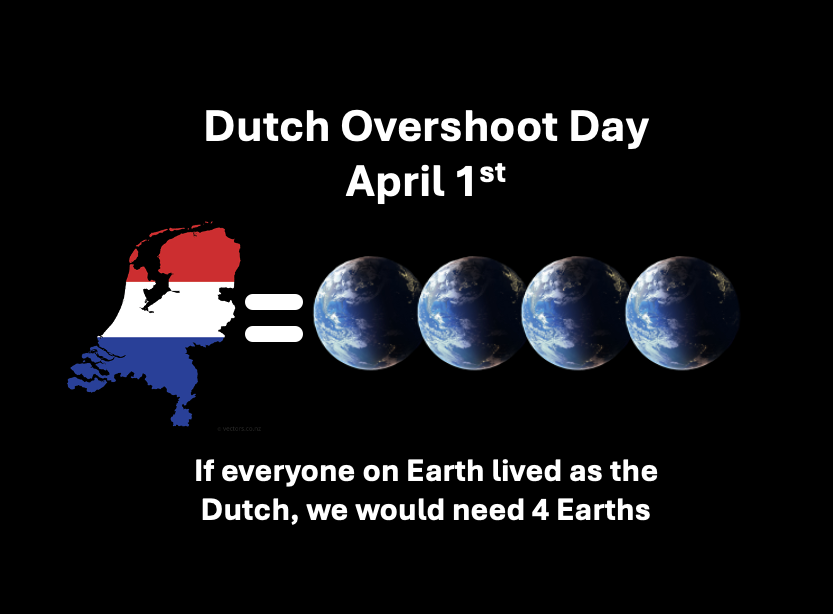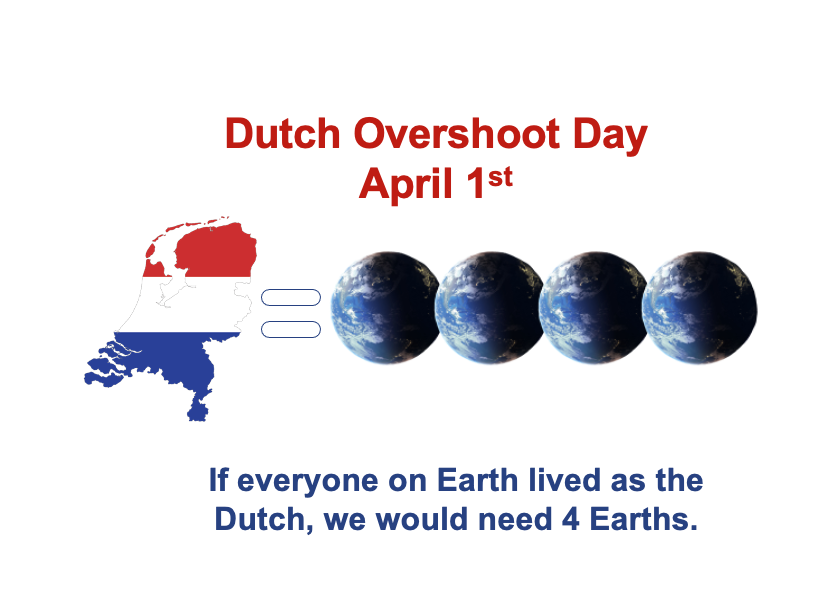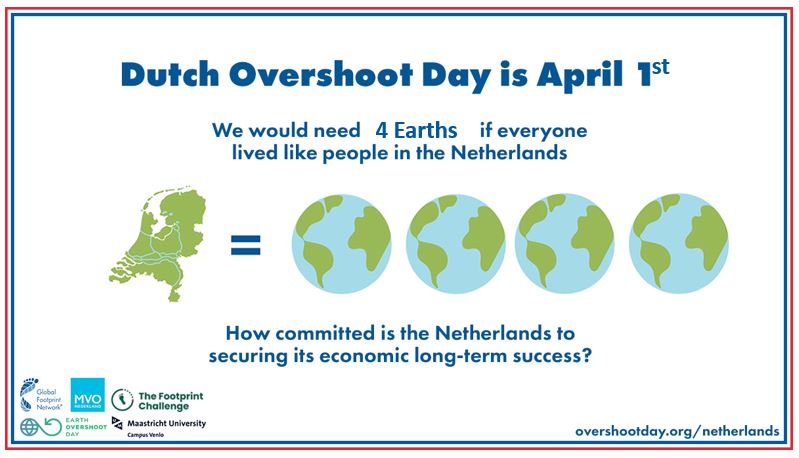It’s no joke: April 1st is Dutch Overshoot Day
PRESS RELEASE 2024
1 April 2024 – Utrecht, Netherlands – If everybody consumed like the Dutch, humanity would need four Earths. This means that nature’s annual budget would be used up within one quarter of the year. Therefore, the Dutch Overshoot Day falls on April 1st .
The Dutch Overshoot Day marks the day when the sum of everything that the Dutch residents, on average, take from nature, from consumption of food, fibre, timber to the emission of greenhouse gases, exceeds the amount Earth can renew per person.
For two decades, Dutch residents have consumed four times what Earth can regenerate per person worldwide. This is “stagnation”, according to some members of the House of Representatives. “It is downright sad that in the past decade we have failed to increase our footprint further. To be strong and accelerate progress, we need more of everything as demonstrated by the shining example of North America and the Gulf countries.” said one anonymous insider.
Those members also emphasize that we should take Aramco CEO Amin Nasser’s counsel to heart. He pointed out that “we should abandon the fantasy of phasing out oil and gas, and instead invest in them adequately, reflecting realistic demand assumptions, as long as essential.” This is also the key message of a leaked internal report from Dutch policy makers, called “More is Better”. The report denounced stagnating at ‘consuming only four Earths’. Rather, the report proposes, our target is to reach 6 Earths by 2030, similar to the US, Australia or the United Arab Emirates. To achieve this goal, policymakers say it is essential to stop current climate policies immediately, double livestock numbers, and further roll back subsidies on public transport so that more people take the car. With the freed-up funds, The Netherlands then can grow Schiphol into the world’s largest aviation hub.
‘Shrinkage is neither sellable nor desirable. Current policies of the outgoing cabinet might lead us to consume only two Earths by 2030, which is clearly unacceptable for the Dutch. We deserve more than merely consuming twice as much as the Earth can handle’. The document also proposed other measures to reverse this trend: ‘Declaring Natura 2000 areas illegal at once solves the so-called nitrogen problem and ending the speed limit on highways will make clear that highways will have to be widened.” By voting down the European Nature Restoration Act, the new Lower House has already secured its first success in getting us back on the 6 Earths trajectory.
When asked by the opposition how such a strategy can keep the Netherlands competitive and livable, they replied: “Nature is grossly overrated. With our colonial prowess of yesteryear, we can even conquer the moon should the need arise. True Dutchmen are unstoppable.”
Several employers in the most polluting sectors are backing the ideas. They, therefore, propose to start consuming like there is no tomorrow. In an ultimate attempt to promote consumption, future ministers are considering making “conserving” punishable. “We should just crack down on those lazy bums who want to buy less,” said a spokesperson. “We are thinking of more shopping nights, promotion of mega-discounts and high-volume low-quality products to strengthen the market for the waste industry. Pollution should also pay for itself. This creates extra healthcare needs which in turn contributes to higher GDP. That’s why pollution is so great for us.”
Clearly, next year Dutch Overshoot Day will not be on 1st April. We also know for sure it will never be on February 30th.
FACT CHECK
Ok, it is April 1st – this is all fake news with the exception of:
- the quote from Amin Nasser,
- the voting down of the EU Nature restoration act, and
- the fact that the Dutch Overshoot Day is falling on April 1st.
For the rest of the year, we live on the back of the younger generation, our kids, and residents of areas already facing climate disruption.
Media Contact:
Joost Brinkman
Email : joost@sinkit.org
Tel: + 31 6 12 60 30 53
A sustainable future is a secure future
Jokes aside. The war in Ukraine and raw material supply problems during disruptions as experienced with COVID-19, make painfully clear how dependent many countries, including the Netherlands, are on resources from other countries. Disruptions to this fragile system can easily undermine any country, including the Netherlands’ economic and social stability. Resource security is therefore becoming an ever more significant parameter of economic resilience and strength. It is therefore only logical for the Netherlands to prepare herself for a world of resource scarcity and climate change.
The Footprint of the Netherlands in brief
- The Netherlands’ Ecological Footprint is 6 times its domestic biocapacity, and, per person, 4 fold the global biocapacity.
- The Netherlands’ carbon Footprint is 60% of its total Footprint. Even if the target of 55% reduction by 2030 is met, CO2 emissions will remain the dominant factor of the Dutch Footprint.
- Nitrogen emissions per hectare are more than 4x higher than the European average. The nitrogen crisis caused by it, is hampering implementation of the energy transition.
- An estimate from last year showed that the Footprint of food-related components (cropland, grazing land, and fishing grounds) makes up 24% of the total Footprint. More than 40% of it, is related to meat and dairy consumption.
Impact of Dutch Climate Policy
The Netherlands’ demand from the Earth isn’t supportable; the Dutch ecological footprint highly exceeds the country’s regenerative ability. Rob Jetten, Dutch Minister of Climate and Energy: “We are running into planetary limits in our small country. That’s why the national government is transforming our economy towards a sustainable & circular economy. Our climate policy plays a central role in this, but it is important to have a broader view. It is crucial that we learn from mistakes of the fossil past and ensure that the conversion to this new economy is in line climate, nature, human rights and the environment.”
The climate agreement and initiatives on sustainable agriculture and circular economy are reducing our footprint. The five measures with the most impact shift Dutch Overshoot Day to 31 June: taking us from 4 to 2 Earths.
- Climate agreement: Reduce CO2 emissions by 55% by 2030 (compared to 1990). If we achieve this, we will make a huge step: 32 days.
- Emission-free transport: If all transport is emission-free by 2030, Dutch Overshoot Day moves up by another 18 days.
- Plant-based diet. If we eat 50% less animal protein by 2030, as proposed in additional climate policies, we move the date up by almost 2 weeks.
- Circular economy: By 2030, half of the materials we use will be circular. As we use fewer raw materials, this requires less energy and emissions, moving up the Overshoot date by 10 days.
- Food waste. 50% less food waste by 2030, in line with the SDG targets, adds another 7 days.
What will it take to bring the date to 31 December
The Global Footprint Network’s analysis showed that current measures are having a big impact, reducing our overshoot by 44%. However, more will be needed to bring our society into balance with the Earth before the effects of overshoot force us to adjust our lifestyles. Besides reducing our Footprint, an important role here is for the agricultural sector to increase the Netherlands’ bio-capacity. Growing bio-based materials and applying circular and regenerative agriculture are concrete examples of this which could be scaled.
“The implications of overshoot are particularly apparent for the Netherlands, including its nitrogen crisis and its struggles with climate policies. Circular businesses are part of the answer. These are businesses that reduce overshoot as they expand. Because of this feature, these businesses also hold the highest promise for increasing in value in times of persistent overshoot” said Mathis Wackernagel, founder of the Global Footprint Network.
Werner Schouten explained in 2023 the Dutch Overshoot Day to an illustrious audience, including the Dutch King and Agricultural Minister Staghouwer (see second 25-35).
Who is behind Dutch Overshoot Day?
Global Footprint Network is an international sustainability organization that is helping the world thrive within the Earth’s means and respond to climate change. Since 2003 we’ve engaged with more than 60 countries, 40 cities, and 70 global partners to deliver scientific insights that have driven high-impact policy and investment decisions. Together, we’re creating a future where all of us can thrive within the limits of our one planet. footprintnetwork.org

Sinkit is on a mission to restore the carbon cycle and stabilize our climate by removing CO2 from the atmosphere. Our goal is to initiate at least 55 carbon removal projects by 2030. Together with our partners, we develop and accelerate natural and technological carbon removal solutions. We help companies and individuals achieve net zero with transparent and traceable carbon offsets, and we raise awareness on the need for carbon removal. Sinkit is a cooperative organization, which means everyone with a shared vision and mission can become a member and invest in Sinkit. sinkit.org
Additional Resources
- Subscribe to our newsletter to participate in the transition
- Summary of the Dutch resource balance: fact sheet on the Netherlands’ Footprint and biocapacity, based on last year’s data.
- Country-level Footprint data platform
- Global scenario calculator
- Your personal Ecological Footprint





